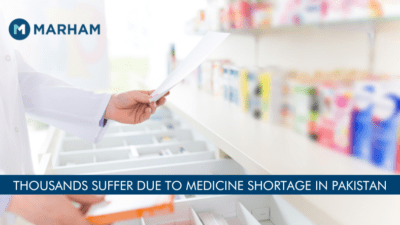The people of Pakistan are in a state of devastation since there are limited resources to handle flood victims and an ongoing medicine shortage is making this situation worse.
The country is facing the worst flood in its history that has displaced more than 33 million people according to data and has caused an outbreak of water-borne diseases.
Dengue fever has expanded to at least 25 districts in Punjab, with 373 additional persons testing positive for the virus in the state in the previous 24 hours, bringing the total number of such cases documented this year to 5,413.
Panadol, Calpol, Dolor, Disprol, Febrol, Brufen, and Nuberol, which are generally used to treat fever and pain in dengue, are reported to be in short supply by pharmacies across the country.
However, gastrointestinal medications such as Gaviscon, Entamezol, Enterogermina, Metodine, Metrozine, Gravinate, and Biflor are also mostly unavailable.
According to industry sources, certain pharmaceutical companies have curtailed or discontinued developing low-cost medications due to rising production costs. They said that the productivity slowdown is due to an inability to raise prices since they are controlled.
The Pakistan Pharmaceutical Manufacturers Association (PPMA) says that the Drug Regulatory Authority of Pakistan provided a report to the health ministry suggesting an Rs. 1 per pill increase, but the federal cabinet rejected the summary.
As a result, the firm, which manufactures 450 million pills every month, has ceased operations. Pakistan is already experiencing drug scarcity, resulting in a crisis-like scenario in Punjab.
This is the worst time for a medicine shortage in Pakistan as there are millions suffering across the country. Punjab has reported the highest cases of dengue yesterday and since paracetamol is a common treatment for the disease people are suffering endlessly.
UNICEF and WHO are actively collaborating with the government and partners to provide flood victims with clean drinking water, vital medical supplies, therapeutic meals, and hygiene kits.
According to Dr. Kaiser Waheed, former head of the Pakistan Pharmaceutical Manufacturers Association (PPMA), donors have been providing significant supplies to flood-affected areas, and the shortfall is mostly due to increased demand.
In such troubling times, online medicine delivery facilities can be helpful to everyone. People can use health care apps like Marham to order medicines online to avoid any hassle.

